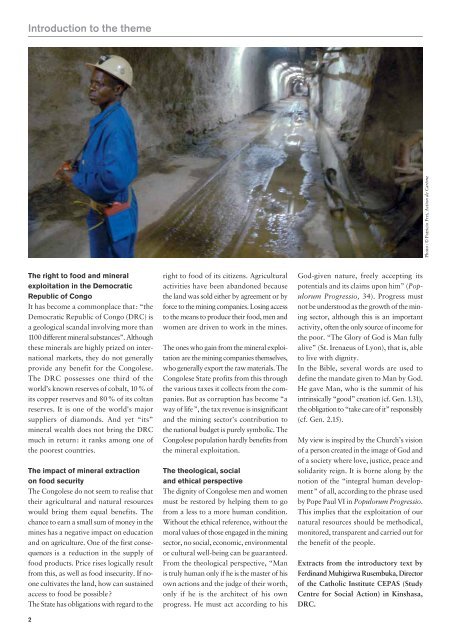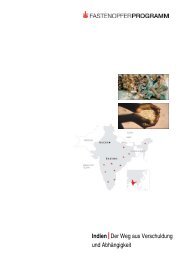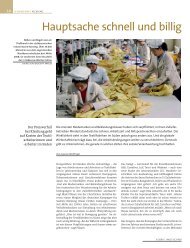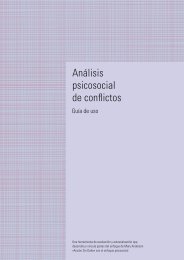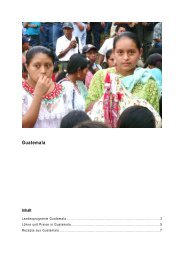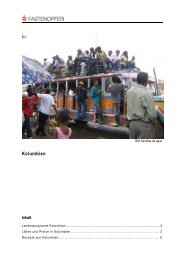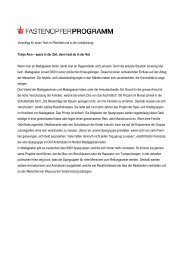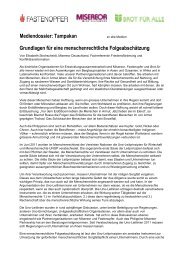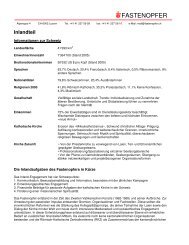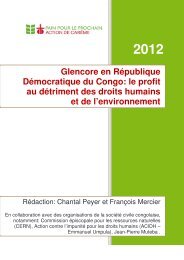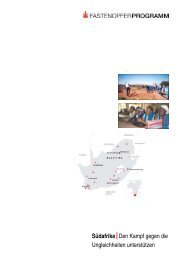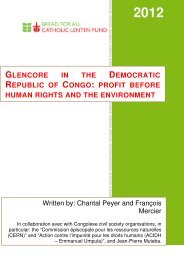The Lenten Campaign - Fastenopfer
The Lenten Campaign - Fastenopfer
The Lenten Campaign - Fastenopfer
Create successful ePaper yourself
Turn your PDF publications into a flip-book with our unique Google optimized e-Paper software.
Introduction to the theme<br />
<strong>The</strong> right to food and mineral<br />
exploitation in the Democratic<br />
Republic of Congo<br />
It has become a commonplace that: “the<br />
Democratic Republic of Congo (DRC) is<br />
a geological scandal involving more than<br />
1100 different mineral substances”. Although<br />
these minerals are highly prized on international<br />
markets, they do not generally<br />
provide any benefit for the Congolese.<br />
<strong>The</strong> DRC possesses one third of the<br />
world’s known reserves of cobalt, 10% of<br />
its copper reserves and 80% of its coltan<br />
reserves. It is one of the world's major<br />
suppliers of diamonds. And yet “its”<br />
mineral wealth does not bring the DRC<br />
much in return: it ranks among one of<br />
the poorest countries.<br />
<strong>The</strong> impact of mineral extraction<br />
on food security<br />
<strong>The</strong> Congolese do not seem to realise that<br />
their agricultural and natural resources<br />
would bring them equal benefits. <strong>The</strong><br />
chance to earn a small sum of money in the<br />
mines has a negative impact on education<br />
and on agriculture. One of the first consequences<br />
is a reduction in the supply of<br />
food products. Price rises logically result<br />
from this, as well as food insecurity. If noone<br />
cultivates the land, how can sustained<br />
access to food be possible?<br />
<strong>The</strong> State has obligations with regard to the<br />
2<br />
right to food of its citizens. Agricultural<br />
activities have been abandoned because<br />
the land was sold either by agreement or by<br />
force to the mining companies. Losing access<br />
to the means to produce their food, men and<br />
women are driven to work in the mines.<br />
<strong>The</strong> ones who gain from the mineral exploitation<br />
are the mining companies themselves,<br />
who generally export the raw materials. <strong>The</strong><br />
Congolese State profits from this through<br />
the various taxes it collects from the companies.<br />
But as corruption has become “a<br />
way of life”, the tax revenue is insignificant<br />
and the mining sector’s contribution to<br />
the national budget is purely symbolic. <strong>The</strong><br />
Congolese population hardly benefits from<br />
the mineral exploitation.<br />
<strong>The</strong> theological, social<br />
and ethical perspective<br />
<strong>The</strong> dignity of Congolese men and women<br />
must be restored by helping them to go<br />
from a less to a more human condition.<br />
Without the ethical reference, without the<br />
moral values of those engaged in the mining<br />
sector, no social, economic, environmental<br />
or cultural well-being can be guaranteed.<br />
From the theological perspective, “Man<br />
is truly human only if he is the master of his<br />
own actions and the judge of their worth,<br />
only if he is the architect of his own<br />
progress. He must act according to his<br />
God-given nature, freely accepting its<br />
potentials and its claims upon him” (Populorum<br />
Progressio, 34). Progress must<br />
not be understood as the growth of the mining<br />
sector, although this is an important<br />
activity, often the only source of income for<br />
the poor. “<strong>The</strong> Glory of God is Man fully<br />
alive” (St. Irenaeus of Lyon), that is, able<br />
to live with dignity.<br />
In the Bible, several words are used to<br />
define the mandate given to Man by God.<br />
He gave Man, who is the summit of his<br />
intrinsically “good” creation (cf. Gen. 1.31),<br />
the obligation to “take care of it” responsibly<br />
(cf. Gen. 2.15).<br />
My view is inspired by the Church’s vision<br />
of a person created in the image of God and<br />
of a society where love, justice, peace and<br />
solidarity reign. It is borne along by the<br />
notion of the “integral human development”<br />
of all, according to the phrase used<br />
by Pope Paul VI in Populorum Progressio.<br />
This implies that the exploitation of our<br />
natural resources should be methodical,<br />
monitored, transparent and carried out for<br />
the benefit of the people.<br />
Extracts from the introductory text by<br />
Ferdinand Muhigirwa Rusembuka, Director<br />
of the Catholic Institute CEPAS (Study<br />
Centre for Social Action) in Kinshasa,<br />
DRC.<br />
Photo: © Patricio Frei, Action de Carême


